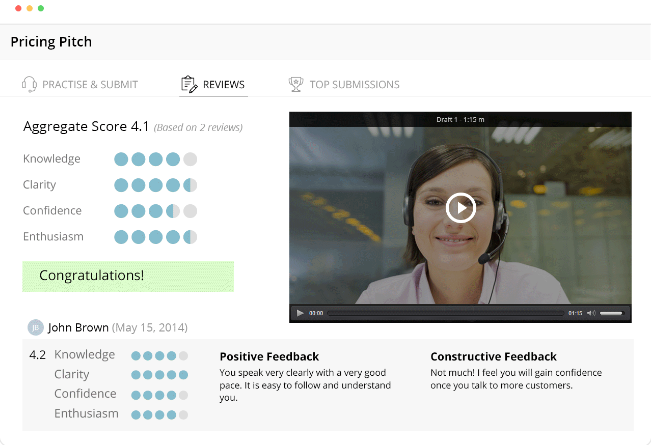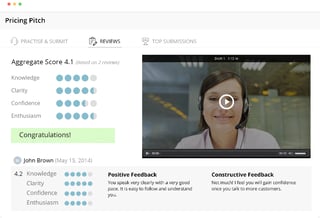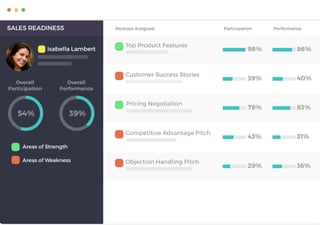The Real Reason Sales Role Play Fails—and How AI Role Play Fixes It
Yesterday, I hosted a live sales training call with a client’s sales team.

Whether your chosen sport is basketball, football, baseball or hockey, the key to getting to the top of your game  and perfecting it is practice. After all, practice makes perfect. We first hear this at a very young age and it’s a mantra that is adopted and followed by top performers in any profession including sales and recruiting.
and perfecting it is practice. After all, practice makes perfect. We first hear this at a very young age and it’s a mantra that is adopted and followed by top performers in any profession including sales and recruiting.
Top performing sales leaders know that in order to give their reps the best opportunity to win, they have to make sure that they have practiced their pitch, can effectively overcome objections, articulate their value proposition, you get the idea. The point is, top performers don't focus on the end goal, they focus on practicing and getting better. It's the time and effort they put into practicing their craft that allows them to achieve their goals. It's the practice time they put in that makes them a top performer.
In this blog post, sales training best practice: leveraging role play, I'm going to highlight why role playing is key to the growth and development of sales and recruiting professionals. I'm also going to share with you different role playing exercises staffing leaders can facilitate with their salespeople.
Just like a baseball player taking batting practice before a game, role playing gives sales reps and sales managers the opportunity to prove that they’re truly ready to get out in front of the customer and execute. Sales role playing tells the sales leader whether or not the sales rep is "conversation ready;" capable of speaking the language of the buyer and can effectively articulate the value proposition. Unfortunately, what happens all too often in sales is reps are “practicing” in front of the customer. If you have a low sales win rate or the top of your sales funnel is light, most likely your reps are practicing in front of the customer instead of with their sales manager.
If the sales leader is not actively engaged in role playing with their sales reps then when is the sales team practicing their sales skills and sales messaging? Imaging teaching your sales rep a new skill or behavior and they go and try to execute it on a face to face sales meeting. What do you think is going to happen? That face to face sales meeting is likely to turn into a “practice” ride for the sales rep which costs the company lost revenue.
Facilitating Role Play
When it comes to facilitating role play it is important that A.) sales leaders are directly involved in the process. This includes the sales leader playing the role of the customer and the sales rep in the exercise because the sales leader’s job is to model the desired sales behavior in front of his or her team and B.) sales leaders understand how to properly structure role play scenarios.
For example, when a rep makes an introductory sales call to a brand new prospect, how they demonstrate credibility and articulates their value proposition makes all the difference in securing the face to face sales meeting. So for sales reps, role playing helps ensure they're conversation ready and can execute in the heat of the moment..
The beauty of role playing is it enables sales managers to ensure that their reps have consistent messaging, which means less room for error. In my humble opinion, role playing is the smartest, quickest and easiest way to improve a sellers ability to execute each and every step of your sales process and to train ourselves on desired sales behaviors and communication skills
When Is The Best Time to Practice?
To get the most out of your people and maximize your talent, top sales leaders understand that they need to become part of how reps learn every day. Role playing is not just a “one time event,” but rather something that is used to help guide and improve the reps sales skills on a daily basis. Just like professional baseball players take batting practice every day, sales leaders should be leading sales role plays every day. Here are a few scenarios where we like to use role play.
Sales Enablement
If you want to create a culture of role playing and avoid it from becoming a “one time event” you need to start of by incorporating it into your sales enablement programs including your sales onboarding, sales training, coaching and reinforcement. To ensure your sales new hires properly deliver the same, consistent messaging, incorporate role play into your sales on-boarding process. This helps ensure the reps are internalizing the material that is being covered during the sales on-boarding process. It also gives them a “safe” place to practice in front of their manager and other new hires.
Sales Kickoffs
As with sales onboarding, sales kickoffs provide an excellent opportunity for sales leaders and sales reps to practice in front of each other and obtain feedback from their peers. It also allows best practices to be demonstrated and modeled and even recorded, ready to be stored in their best practice library for future reference.
Reinforcement Training and Coaching
Reinforcement coaching is also an important part of an effective sales enablement program on an ongoing basis. Role playing provides an opportunity for reps to practice various sales scenarios including pitching, objection handling, negotiation, value propositions and the use of case studies and handling other curve-ball questions that prospects throw at sales reps.
 As a general rule, for every common customer facing scenario a sales rep faces, you should be role playing it. At Menemsha Group, we have built (and it continues to evolve) a library of uses cases that describe all of the most common scenarios IT staffing sales reps face when selling IT staffing services. Our clients are then prompted to engage in role playing through all of these different scenarios. Our training platform allows reps to record themselves into their computer (video and audio recorded).
As a general rule, for every common customer facing scenario a sales rep faces, you should be role playing it. At Menemsha Group, we have built (and it continues to evolve) a library of uses cases that describe all of the most common scenarios IT staffing sales reps face when selling IT staffing services. Our clients are then prompted to engage in role playing through all of these different scenarios. Our training platform allows reps to record themselves into their computer (video and audio recorded).
We have learned that isolating specific situations for practice is most effective, such as responding to a specific objection or conducting an initial meeting with a certain buyer type. The point is, you want to break you role play scenarios down into specific pieces.
Whenever a new customer/prospect objection arises or for every deal that your company loses, the lost reason should become a scenario in your role play library. Lastly, role plays can be used to practice the new or revised pitch until it’s ready for a customer.
Best Practices for Implementing Role Play
Below are a few tips and best practices for implementing role plays within your organization efficiently and effectively.
Breaking Down Role Play Scenarios
Rather than try and role play an entire customer meeting, it’s helpful to break role plays down into smaller, bite sized pieces so that reps can focus on mastering one thing at a time. As a rule of thumb, role play scenarios should only focus on 1-2 goals or objectives. You don’t want a role play that asks the reps to learn and execute 5 different things. It’s too much and it will overwhelm them.
For example, to break down a face to face customer meeting role play into bite size pieces you might organize it like this:
Remember, when teaching your reps to role play out your sales process you can always add more information into each step of the role play. This will allow the reps to master that step without adding more complexity.
Scaling Role Play & Freeing up the Sales Leaders Time
With sales reps spending most of their time in the field or on the phone prospecting, it can be difficult to find  enough time to role play face-to-face. An online e-Learning platform can help scale role play practice. The majority of the role plays scenarios your reps need to practice are things that can be standardized, such as the most common or most frequent objections, your value proposition and “elevator pitch.” Taking advantage of an online learning management platform like Menemsha Groups allows sales leaders and sales reps to access pre-built and standardized role play scenarios that IT staffing sales professionals need to practice. Sales reps video record themselves role playing a specific situation. The video can then be shared with the sales leader or even peers, for coaching and feedback. This scalability allows sales reps to practice from wherever, whenever they want. Additionally, it frees up additional time for the sales leader to provide active sales coaching
enough time to role play face-to-face. An online e-Learning platform can help scale role play practice. The majority of the role plays scenarios your reps need to practice are things that can be standardized, such as the most common or most frequent objections, your value proposition and “elevator pitch.” Taking advantage of an online learning management platform like Menemsha Groups allows sales leaders and sales reps to access pre-built and standardized role play scenarios that IT staffing sales professionals need to practice. Sales reps video record themselves role playing a specific situation. The video can then be shared with the sales leader or even peers, for coaching and feedback. This scalability allows sales reps to practice from wherever, whenever they want. Additionally, it frees up additional time for the sales leader to provide active sales coaching
Lastly, by enabling reps to watch how their peers handle different objections or pitch their value proposition they can continue their learning.
Create Opportunities for Face to Face Feedback
Keep in mind that you will not be able to standardize every single scenario. For those other scenarios you will need to make sure you create enough weekly and monthly opportunities for face to face feedback role play and feedback.
It’s important to maintain human touch to enable reinforcement and adoption, and for managers to ensure consistency. The key to effective sales enablement here is to ensure that managers create opportunities for this kind of face to face practice and feedback. This is where we suggest that sales leaders have a weekly coach call scheduled with their reps where they can discuss and review these topics in person (or over video chat).
Provide Actionable Feedback
Feedback is critically important but for it to be impactful it needs to be actionable and time bound. Even if a rep does a great job with executing a role play the sales leader needs to make sure they give them feedback as to why they did so well. Giving positive feedback reinforces to the rep the behavior they need to continue displaying.
The best feedback is feedback that incorporates real life examples or an includes an actual demonstration. Being able to point to a recording to make a point is especially powerful. It is also powerful when the sales leader can demonstrate the desired sales behavior or what success actually looks like. This is where leaders share how their peers do it (video/audio recording) so they can learn from them and follow the modeled behavior.
If managers use a platform like Menemsha Group’s to allocate the role plays, they can also use data from the application to identify knowledge or application gaps and inform their feedback. For example, they can see how many times the rep practiced the role play before submitting the final one and compare their performance to that of their peers. This technology enables managers to provide specific and pointed feedback to reps that can be acted upon.
Use Role Plays to Share Best Practices
If you have your entire team practicing role plays, video themselves and improving their pitch and objection handling, you’ll soon have a plethora of examples. These shouldn’t be deleted as they are helpful training tools, both for the individual rep and the broader team.
What we have learned from our customers is that yes, most sales reps despise role playing (especially in front of their peers), BUT they LOVE to watch others. They get tons of ideas on what to do and not do.
These role plays can be stored using a platform like ours to create an online library of best practices that are available to all reps to review and learn from whenever it suits them.
To learn more about sales enablement and how to strategically and methodically improve the performance and effectiveness of your sales team, download our ebook, The Staffing Leaders Guide to Sales Enablement.

Yesterday, I hosted a live sales training call with a client’s sales team.

1 min read
Most staffing firms don’t struggle to scale because their teams aren’t working hard. They struggle because they don’t have a real go-to-market...

In my previous post, How to Prevent Unexpected Contract Terminations, I shared how systemizing consultant and client check-ins at key milestones...